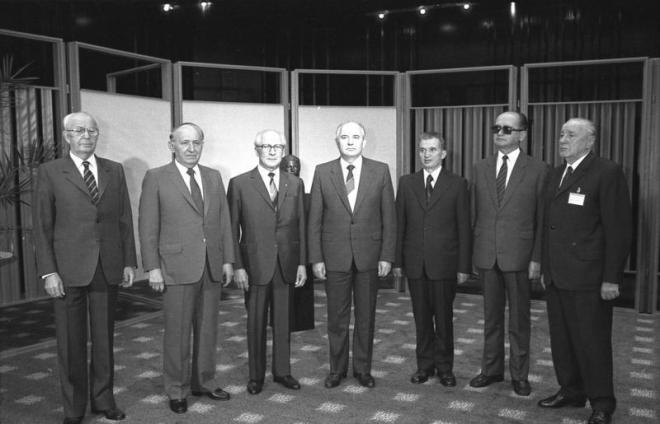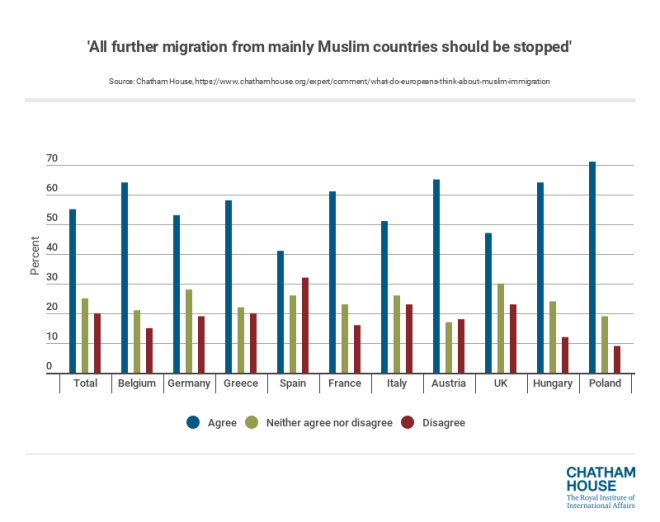This article is part of a series of articles on the end of the liberal world order and the emerging post-liberal geopolitics which will replace it. I recommend that readers also read, in conjunction to this article, my post Europe’s coming Campi Flegeri explosion, the global implications of a Trump presidency and winter is coming.

“The most important trends shaping the political landscape of our time, to my mind, are the descent of the liberal movement into its final decadence, and the first stirrings of the postliberal politics that is already emerging in its wake.”
John Michael Greer (The Coming of the Postliberal Era)
On 29 May 1987 the pictured leaders of the Warsaw Pact, the Communist military alliance, met to discuss matters of importance within the Soviet bloc. The division of the world into two major blocs had been a permanent feature of geopolitics since the end of the last Gotterdammerung, the fall of the Third Reich in 1945. The possibility that the Soviet world would implode within a few years would have been considered unthinkable by most observers of world politics, including the foreign policy elites of the Western world.
In a few years, when the Berlin wall came crashing down and the Red Army withdrawn from Eastern Europe, these confident leaders of a once mighty military and political bloc would fall from power amid massive street protests. The collapse of the Soviet Union and its external empire was an end of a world order based on the ideology of Communism. Perceptive observers of the Soviet bloc had noticed for years the crumbling of its foundations and there were a number of individuals who successfully predicted the collapse of the Soviet world order. Yet, with hindsight, it is sobering to note that few foresaw the possibility that the Soviet “house of cards” could and did come crashing down.
I consider the liberal world order, based on the free movement of labour, capital and trade within a globalized economic model is now facing its own terminal decline and death. One could write a book on the causes behind the collapse but I would argue that the primary factor, the Limits to Growth megatrend, is driving this collapse even if it is gone largely unnoticed. The peaking of conventional oil supplies and the long-term rise in oil prices, contributed to the financial crisis in 2008 and the “secular stagnation” which has so puzzled economists since then. Hard limits in the resources which powers our economy is incompatible with an economic-financial system which assumes limitless sources of energy will always be available and that physical reality is starting to impact.
The stagnation and decline in real living wages for the bulk of the citizenry of the developed world, which is a direct consequence of our growing resource scarcity predicament, has been a body blow to the authority and power of our governing liberal elites. The political shocks of 2016, the Brexit vote, the election of Donald Trump and the crushing defeat of the “yes” campaign in the Italian referendum, are the belated political reaction in the face of these long-term trends.
A core part of the liberal world order was a belief that nationalism was a thing of the past which would surely fade away as we became ever more globalised in the brave new world of Facebook, cheap flights and Amazon. This has not happened. Raw nationalism is back as a powerful political force as nationalist strongmen come to power across the world. The rise of these Caesar’s is a common pattern in history and is a sign that our own industrial civilisation is in a state of terminal decline, as John Greer wrote recently.
To understand why these charismatic strongmen, and potentially strongwomen, are coming to power one must explore the writings of Arnold Toynbee. I have written before on Toynbee’s civilisation model, with its division of the world into a dominant minority who rule a society, an internal proletariat (the workers) and an external proletariat outside the core regions of the civilisation at that time. The ideology of political liberalism finds its strongest adherents among the elites of society and those who benefit from the status quo, the financially comfortable middle classes, who constitute approximately 20% or more of society. Among the internal proletariat, who constitute the rest of the population, support for liberal values is in progressive decline as their living standards slowly disintegrate.

This collapse in support for liberal values can be illustrated in the sobering opinion poll commissioned by the prestigious Chatham House institute, the results which are shown above. Majorities across Europe now support a ban on any further migration from mainly Muslim countries, including a remarkable 61% in France, which faces presidential elections in April/May. Currently only the National Front candidate Marine Le Pen has indicated that she could support such a policy. Clearly the internal proletariat’s of Europe are embracing populist, nativist and nationalistic ideologies which pose a huge challenge to our modern dominant minorities.
One response of a dominant minority is to enter into an alliance with the hordes of desperate external proletarians who wish to benefit from residing in the wealthy core of a civilisation. For decades, big business in America has benefited from the work ethic of millions of illegal immigrants who have come across the Mexican border to do jobs ordinary Americans don’t want to do. The election of President Trump, as I predicted in January 2016, was in part to the growing anger of many within the American proletariat to this state of affairs.
The German liberal elites, led by Angela Merkel, made a deliberate decision in 2015 to let in over a million predominately Muslim migrants from the non-European world into Germany. As this German article notes, the German government is aware of Germany’s low birth rate and the need to find new workers as its own internal proletariat shrinks in size. Or, to use Toynbee’s language, the German dominant minority have imported over a million external proletariat’s to in effect replace and supplant a declining internal proletariat which is increasingly hitting retirement.
The liberal world order, already in a profound crisis with the election of a neo-isolationist and nationalist President Trump, is unlikely to survive in the face of the defection of their internal proletariat’s to the new post-liberal ideology of populist nationalism. Opinion polls show that the majority of Americans back the Trump administration’s hard-line immigration policy and crackdown on illegal immigration, despite the howls of outrage from the liberal elites. It is also noteworthy that sixty-five percent of Americans reacted positively to the “America First” message in President Trump’s inauguration speech. The truth is that whatever individual voters views on the man himself, majorities back Trumpism and reject the foundations of the liberal world order.
Should Europe join America in rejecting the key tenets of liberalism, including free trade and relatively open border migration policies, the liberal order would go down a similar path to the lost world of Soviet Communism. I consider this very likely in the years ahead. Future historians may look back at the gatherings of our current Western liberal leaders in the same way that we react to pictures of those stony faced Communist leaders in the eighties before they were swept away by the forces of history.
I wonder if there really was a “liberal world order” to begin with- was it any more than the defining myth that propped up the ruling elite of a particular power bloc or structure? (Namely, ) “Liberalism” exists when it is convenient for the aforementioned ruling classes so to do, the freedom of business to move around the world and to hire whomever it will. When it suits those same interests to prop up oppressive regimes, or to control governments and legislation to its own ends in sometimes quite illiberal ways, or to use “spreading freedom and democracy” as a guise to invade other countries for its own ends, then it does so. Is it any wonder then that the people whom the myth is not genuinely designed to serve see it is no longer working for them, they might reject it? (As suggested in your article, the importation of migrants from the Middle East and Africa into Germany, say, has as much if not more to do with the economic needs of German industry – in short capitalism – as it does to do with any humanitarian concerns over helping refugees, and certainly very little to do with the needs of the “internal proletariat” of Germany.)
I suspect that much the same could be said for the USSR and the Eastern Bloc- whose underlying ideology claimed to be some development of Marxist Communism but seems in practice to be anything but the working classes taking over society for its own benefit (as Marxism is supposed to be about) and everything to do with the formation of a new ruling class. When the myth failed, it became unsustainable as a means of keeping the proletariat in order and the system it underpinned was bound to collapse (or at least be done away with) sooner or later.
In the case of the collapse of this order – or indeed both orders – we see indeed a resurgent nationalism, but I think this is yet another, older and more comforting myth being used by other elements of the ruling class [can we really suppose the likes of Trump are not elite?]. It is easier for those to put the blame on foreign sources of woe- the immigrants coming in to take our jobs, spread their regressive social values, and amongst whom may be criminals or terrorists. Or blame the outsourcing of “our” jobs to overseas. Or to the recipients of misdirected foreign aid. Never once questioning whether the ruling classes or the capitalist system was in any way to blame for any of the woes of the internal proletariat. Never questioning whether, say, the terrorism is not in part caused by the actions of the ruling classes of various power blocs. And since it suits them to be opposed to rival power blocs that threatened the old order – for example with the rise of China – it is easy to portray a common cause in this nationalism. But whether nationalism actually suits the interests of the proletariat, remains to be seen.
LikeLike
(By “Namely…” I meant the Western/American centred power bloc.)
LikeLike
(Of course, please try to forgive me if I interject my own views here, or conflate different meanings of the term “proletariat”- perhaps Toynbee used it in a different sense to that of Marx- or am somewhat lacking in actual analysis here.)
LikeLike